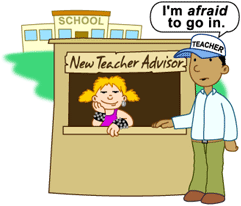Welcome back to school! I hope everyone had a great summer and was able to relax and recharge. Most schools around here start next week, with new teachers starting this week.
The beginning of the year is always a little crazy for all teachers. Getting your room setup, implementing new ideas into your lesson plans, getting to know your students, and just settling back in to the routine can be busy and stressful. Remember to not over do it and take time for yourself.

One thing I've done in the past that helped me is using a check list of everything I have to do when school starts, including setting up my room (computer, bulletin boards, etc), things I want to post in my room, lesson ideas and more in Evernote. I modify it each year, adding new things for the following year.

Here are some more tips, resources, and help to get your school year started on a positive note, and keep it that way.
Advice to New College Graduates about to enter the Teaching profession
Summary of new teacher tips, urban schools issues, technology resources
Google for Educators - Google has a huge number of free resources for teachers and students. Check them all out (they're all free).
Microsoft Education Resources - resources for admin, IT and teachers
Evernote for Education Resources - the ultimate note taking, web clipping, lesson planning resource
Create a Personal Learning Network - a PLN is an excellent resource for help, advice, and sharing ideas.
Overview of some free technology that can help you be more organized and efficient.
Related:
List of What Makes a Good Teacher - created by students
Great resources for New Teachers - advice, support, and training
Advice to New College Graduates about to enter the Teaching profession
Making School Relevant for Students
10 Important Skills Students need for the Future
10 Tech Skills Every Student Should Have
Getting Students and Teachers Organized - tips and resources
Good luck and I hope everyone has a great school year!!
-
Making School Relevant for Students
10 Important Skills Students need for the Future
10 Tech Skills Every Student Should Have
Getting Students and Teachers Organized - tips and resources
Good luck and I hope everyone has a great school year!!
-










